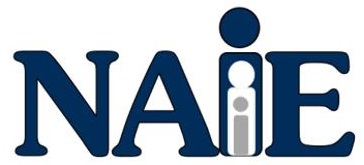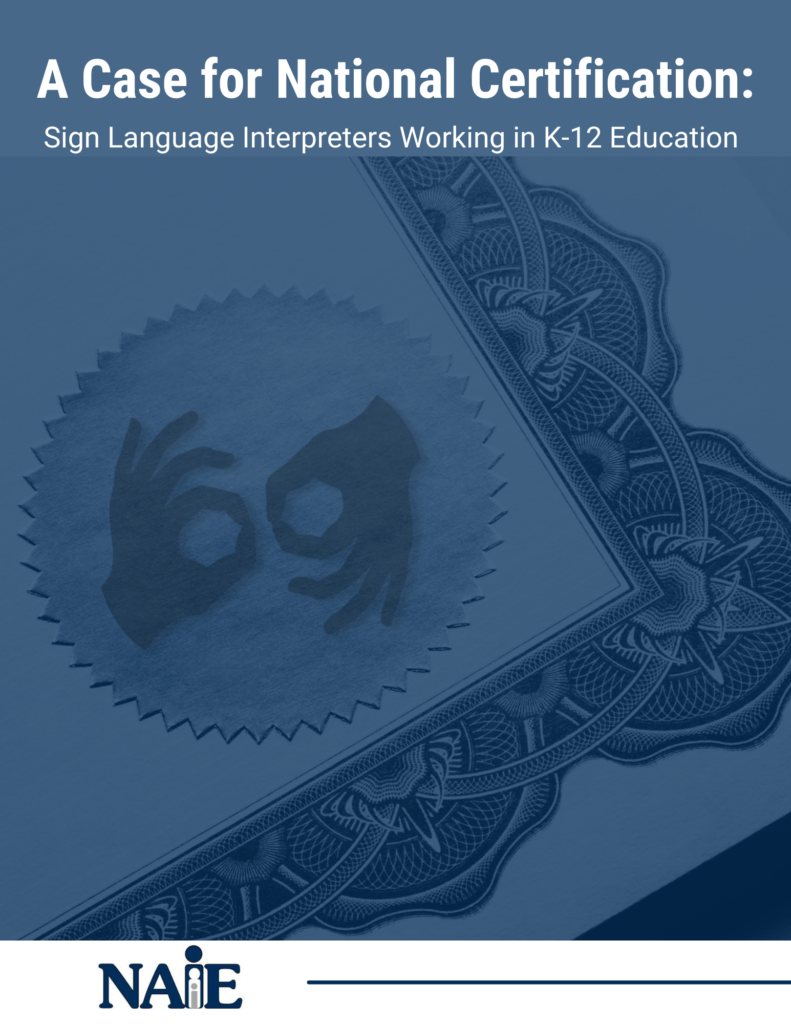A Case for National Certification: Sign Language Interpreters Working in K-12 Education emphasizes the need for further professionalization of the educational interpreting field, drawing attention to the challenges faced by DHH students and the importance of qualified interpreters in their educational journeys. By examining the current state of professional standards for interpreters (and other related service providers), certification, and state regulations, this paper aims to contribute to the ongoing discussions and efforts to improve the educational outcomes and experiences of DHH students through the provision of highly effective and qualified interpreting services.
NAIE is actively pursuing the establishment of a credentialing program, and recognizes the importance of investigating a national certification model as the leading organization for interpreters working in education. The implementation of certification and other credentials for educational interpreters is a crucial step towards standardizing professional practices.
Although we acknowledge that the certification process is complex within the interpreting field, our ultimate objective is to have standard credentials recognized and enforced at the state level as minimum requirements for interpreters working in K-12 educational environments.
Currently, there is a lack of a national standardized certification specifically designed for interpreters in education (refer to State Requirements for Educational Interpreters). NAIE’s Professional Guidelines for Interpreting in Educational Settings aim to promote the following standards of professional practice:
Task Force Goals
The Credentialing Task Force (CTF) will investigate credentialing models, such as certification, to determine how one could possibly be implemented to provide a pathway to qualifying educational interpreters. Findings and recommendations will be provided directly to the NAIE Board of Directors. The CTF has been charged with the following tasks:
- Publish a white paper on the importance of certification for the educational interpreting field by January 2023.
- Research credentialing program structures and provide a full report to the NAIE Board by January 2024.
- Task force members, along with the NAIE Board, develop an action plan by January 2025.
Task Force Members
CHAIR – Stephanie Zito, MS, NIC
NAIE Past President, CTF Chair
Interpreter and Captionist
Owner, Steph Zito LLC
BOARD LIAISON – Anne Donnelly, MFA
NAIE Credentialing Director
Interpreter, Cincinnati Public Schools
Adjunct Instructor, Cincinnati State’s ITP
Kimberly Hutter, Ph.D.
NAIE Past Vice President
Chief of Outreach and Communications
Tennessee Schools for the Deaf
John Kirsh, M.Ed.
DHH Education Consultant
Michigan Dept. of Education – Low Incidence Outreach
Frances Beaurivage, CI/CT
EIPA Advisor
Boys Town National Research Hospital – EIPA Diagnostic Center
Linnae Janky, MA
EIPA Rating Reliability Coach
Boys Town National Research Hospital – EIPA Diagnostic Center
Michelle Morales, Ed.D.
Deaf Educator
Baltimore County Public Schools


